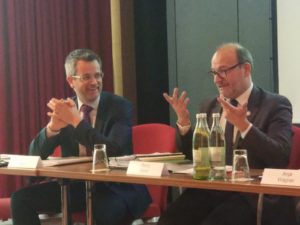
Source: Damien Barchiche
The long lasting and intensive cooperation of French and German development politics dates back to the signature of the Élysée treaty in 1963. The treaty of Aachen, which was signed in January 2019, is designed to strengthen this cooperation and enhance joint opportunities to achieve global sustainable development – both regarding the cooperation with bilateral partners in the global South as well as within supranational and multilateral fora like EU, UN, G7 or G20.
During a workshop in Berlin, organized jointly with the French Institut du Développement Durable et des Relations Internationales/Institut d’études politiques de Paris (IDDRI), on 5 April 2019, recent research regarding Franco-German development cooperation was discussed. The considered topics reached from the national institutional settings over bilateral cooperation to the coordination at the EU and the multilateral level. Findings were illustrated by concrete examples (Sahel Alliance, climate change mitigation, populisms, cooperation with the partner countries India and Morocco). About 40 experts from the French and German ministries, the implementing agencies, civil society as well as international organizations discussed the research results and provided important input for further analyses as well as political debates. The workshop closed with a policy round table including the CEO of the French development bank (AFD) and representatives of BMZ, the French foreign ministry as well as KfW, who provided an outlook on the future of French-German cooperation.
Schreibe einen Kommentar